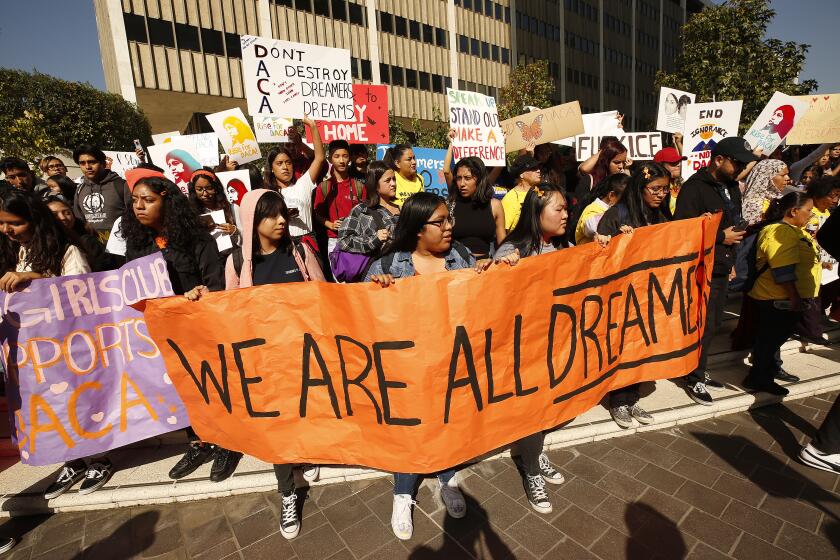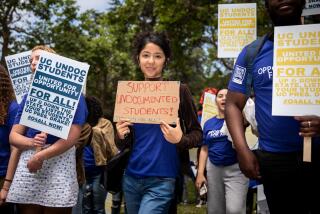UC regents take groundbreaking step toward hiring immigrant students without legal status
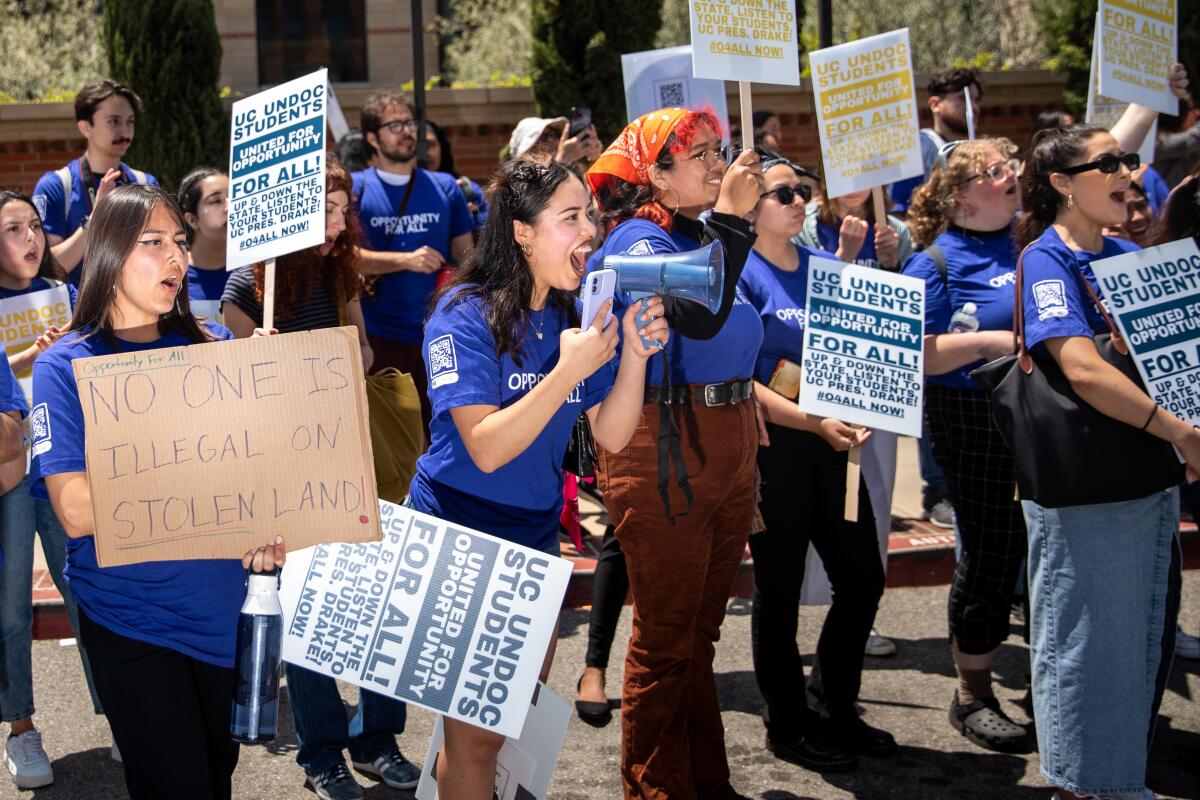
The University of California regents, saying they support an equitable education for all, unanimously agreed Thursday to find a pathway to enact a bold policy to hire students who lack legal status and work permits.
The groundbreaking move would reshape the lives of thousands of young people who were brought to the country without papers as children and have lived precariously without legal access to jobs, research positions and career opportunities. California is home to about 1 in 5 of the nation’s college students without legal authorization.
The public university system has been under pressure to challenge a 1986 federal law barring the hiring of immigrants without legal status by asserting that it does not apply to states. A novel theory developed by UCLA law scholars argues that the federal law does not specifically include states — or UC, as a state entity — in its language establishing employer sanctions and therefore does not apply to them.
The regents voted to form a working group to examine that legal issue, along with practical considerations about how to roll out a policy that is already igniting controversy. But they made clear they are committed to their immigrant students and said the working group would complete its proposed plan by November.
“Absolutely, it is our intention to find a way to allow employment opportunities for all our students, regardless of their immigration status,” said Regent John A. Pérez, one of the key leaders in the effort to push a new policy forward. But he added the university needs time to work through the complex issue.
“This is too important to get wrong,” he said.
UC President Michael V. Drake and Board of Regents Chair Rich Leib also affirmed UC’s commitment to equity. “The University is committed to ensuring that all students, regardless of their immigration status, can pursue and attain a world-class UC education. This should include providing enriching student employment opportunities to all students,” they said in a joint statement.
Students without legal status, along with their allies who have been collectively pushing for the right to work, said they were thrilled.
“This is a historic win for the immigrant rights movement that UC has agreed that undocumented students should have equal access, that we should have a seat at the table,” said Karely Amaya, a UCLA graduate student in public policy who was brought to the United States illegally from Mexico at age 2. She lost out on a campus job that would have given her financial stability and research opportunities because of her status.
The high-stakes decision evolved over the last few days, as advocates for immigrant students listened to concerns of uncertain regents and tried to bring them around. Some questioned whether hiring students without work authorization would imperil their safety and any future ability to legalize their status. Students, however, say it should be their decision to weigh those risks.
UC officials have also weighed the potential for litigation against the university, public backlash and possible legal exposure to faculty and staff who would hire the students. Leib said regents need to make sure they consider the effect on all university members, including campus leaders who will need to implement any new policy.
Critics have warned of ramifications if UC moved forward with hiring those without legal status.
“If officials at the University of California were to knowingly hire aliens not authorized to work under federal law, they would be opening themselves up to both civil and, potentially, criminal penalties,” said George Fishman, a senior legal fellow at the Center for Immigration Studies.
Rep. Darrell Issa (R-Bonsall) wrote to Gov. Gavin Newsom this week asserting that federal law preempts state or local immigration actions and implied that UC would lose its federal funding by adopting the “legally unsound and sweeping policy.”
Regent Jose Hernandez, the son of Mexican migrant workers who became a NASA engineer and astronaut and now heads an aerospace firm, said he had been prepared to vote to authorize the hiring despite the risks, but supported the working group.
“It’s these tough decisions where one has to stand up and do the right thing,” he said. “We need to give every student the same educational opportunity. And right now we have a two-class system where our undocumented students aren’t allowed to partake in gaining that experience that’s going to be useful for their careers.”
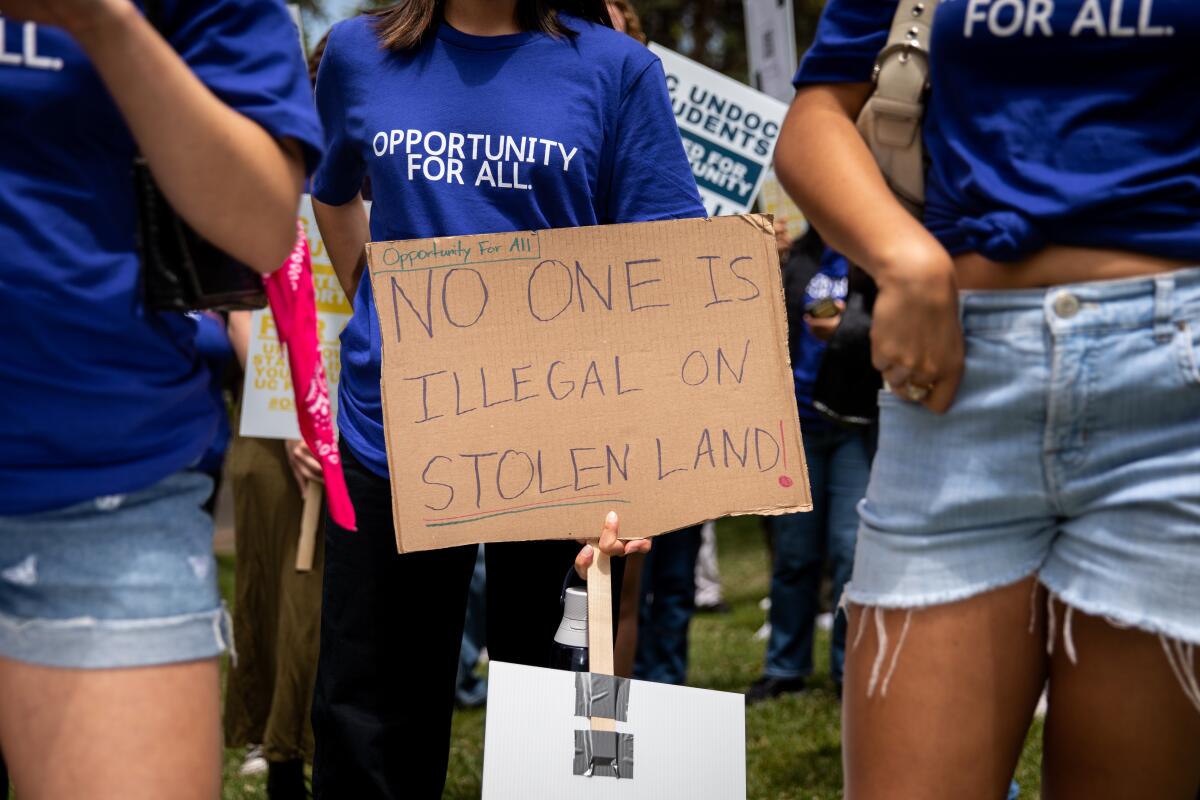
The plight of students without legal status has intensified since 2017, when the Trump administration ended an Obama-era program known as Deferred Action for Childhood Arrivals — or DACA — which granted work permits and protection from deportation to certain youths who were brought to the United States as children.
A court ruling subsequently limited the government to granting DACA renewals — not accepting new applications — which has shut out a new generation of recipients. In 2023, an estimated 100,000 immigrant youths graduated from high school without legal status or DACA benefits — including about 27,000 in California.
About 44,000 students without DACA attend California colleges, which means many are prohibited from entering the labor market. About 4,000 of them attend UC.
The University is California is being pushed to break legal ground by hiring immigrant students without work authorization in a test of federal law that could alter tens of thousands of young lives.
At a rally Wednesday at UCLA, where the regents met this week, students without legal papers came from all nine UC undergraduate campuses to share their stories.
Yamir Aleman, a UC Irvine fourth-year student studying psychological science, said he was brought to the United States from Mexico at age 10 in 2010 — missing the window of eligibility for DACA status by three years.
Aleman managed to land a paid fellowship at the UC Irvine Dream Center, which supports those affected by immigration policy, but he worries and wonders about his future.
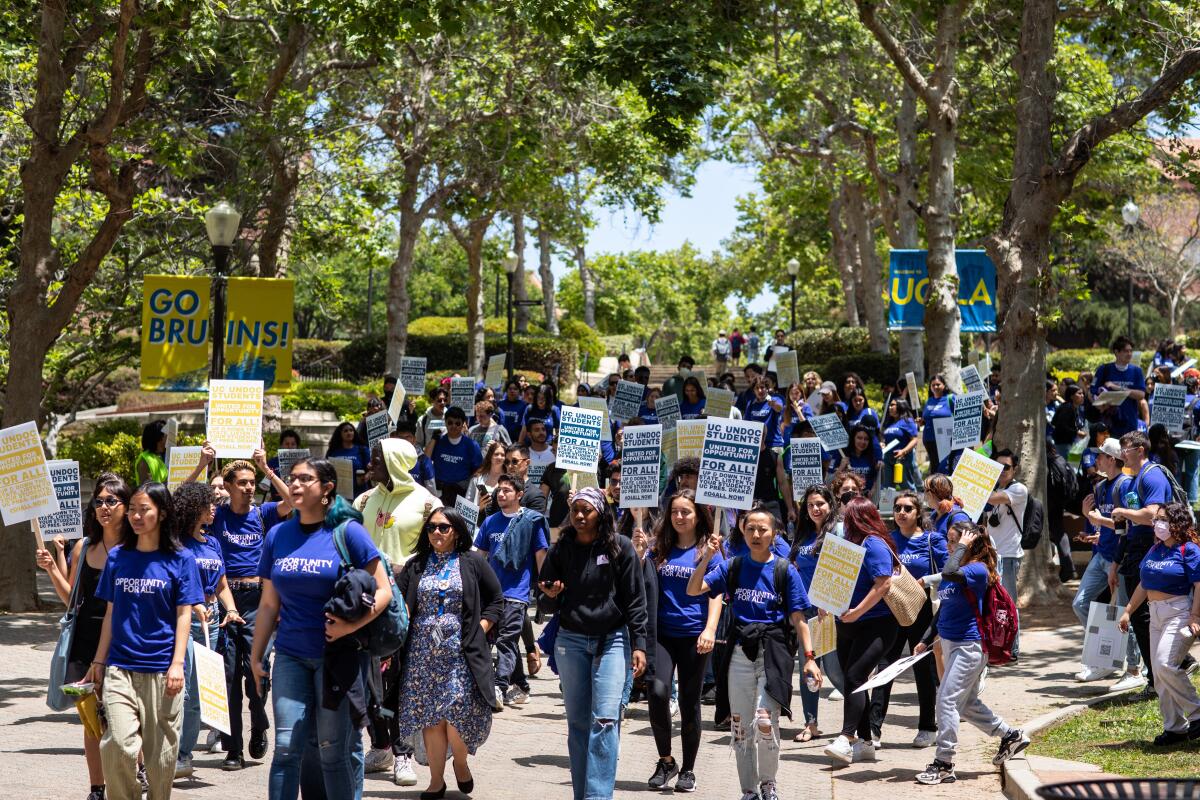
“There’s been a lot of insecurity and instability,” he said. “Undocumented students give their best, but a lot of times we feel overlooked and overshadowed.”
The ban on hiring noncitizens without work authorization stems from the 1986 Immigration Reform and Control Act. The landmark law, signed by President Reagan, granted residency to about 3 million people in the country illegally and outlawed the hiring of workers without papers.
But scholars at the Center for Immigration Law Policy at the UCLA School of Law last year crafted a new legal analysis arguing that the federal law did not apply to states because it doesn’t mention them. A memo signed by 29 immigration and constitutional scholars argued that before the 1986 law, the U.S. Supreme Court ruled that if Congress wanted to change the balance between federal and state power by regulating an area under traditional state control, it must do so with unmistakably clear language.
Fishman, however, argued that Congress established the employer sanctions to weaken the job magnet luring migrants to the United States without papers and did not feel a need to “state the obvious” that states acting as employers would be subject to the law.
For Student Regent Marlenee Blas Pedral, the issue has been deeply personal. Blas Pedral, who graduated from UC Berkeley law school this week, said she empathizes with students because she was born in Mexico, was brought to the United States without papers and was able to legalize her status — allowing her to take full advantage of the opportunities here.
“This issue is near and dear to my heart,” she said. “At the end of the day, I have benefited so much from my UC education, both as an undergraduate and now as a law student, and I want students to be afforded that same opportunity.”
More to Read
Sign up for Essential California
The most important California stories and recommendations in your inbox every morning.
You may occasionally receive promotional content from the Los Angeles Times.
